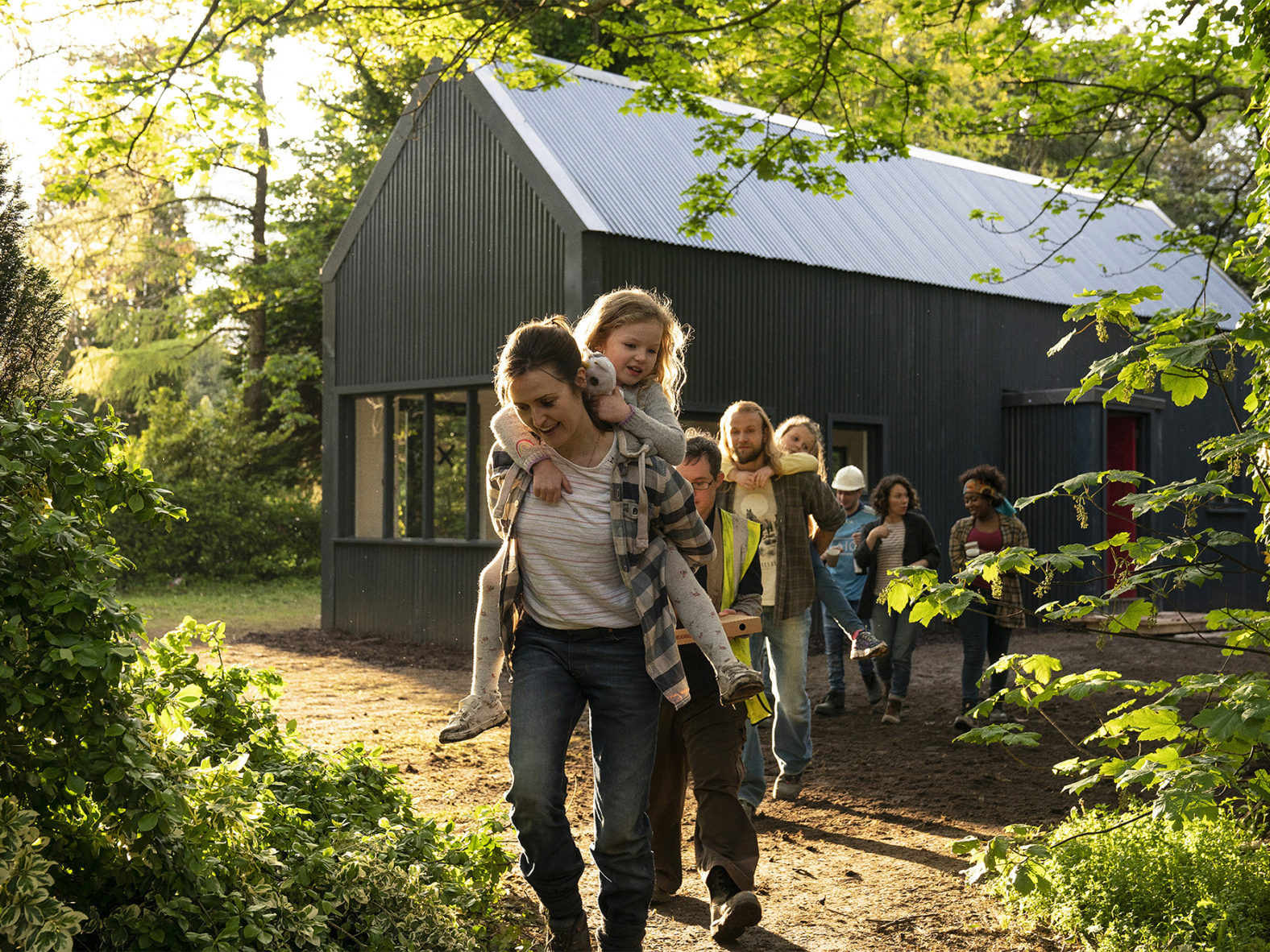Nine years after the release of her last film, 2011’s The Iron Lady, Phyllida Lloyd has returned to the director’s chair for Herself. Starring co-writer Clare Dunne, with Game of Thrones fan-favourite Conleth Hill, and Downtown Abbey and The Crown star Harriet Walter in supporting roles, Herself chronicles a battered woman’s journey to rediscovering her worth and sense of self as she builds a house.
Sandra, a gentle looking woman, is the mother of two young girls Emma and Molly. Her life appears abundant; she allows her daughters to give her makeovers and then they dance in the kitchen to bubbly pop songs, simply enjoying each other’s company. Quickly, the energy in the room shifts as her husband Gary (Ian Lloyd Anderson) comes home. Immediately sensing that she’s in danger, Sandra gives her eldest daughter a codeword and armed with an empty lunchbox, Emma runs to the nearest store and reveals Sandra’s secret cry for help taped to the underside of the lid: “Call 999. My life is in danger”.
Intimate partner violence is sadly all too common. Research conducted by the World Health Organisation on behalf of the United Nations between 2000 – 2018 concluded that 1 in 3 (approximately 30%) of women worldwide are subjected to physical and/or sexual violence by an intimate partner.
Sandra’s escape from Gary looks like a victory at first. She made it out with her life and her girls, but as Herself makes painfully clear, the route to freedom doesn’t stop being difficult once there’s space between a victim and their abuser. Like many battered women, Sandra is put up in government funded accommodation, a cramped hotel room that she’s not even allowed to access via the main entrance lest it damage the hotel’s pristine 4-star image. Meanwhile, Gary has the luxury of living with his parents. The difference in their circumstances feels cruel. So, when Sandra decides to take her future into her own hands, literally, and build a new home for herself and her girls, it feels like a real triumph.
Banding together with a ragtag crew of acquaintances and new friends, Sandra sets to work to build a better home for her family. Conleth Hill leads the crew as builder and site foreman Aido, a gruff man with little patience for tomfoolery who proves to have a softer heart than he’d ever let on. For viewers used to seeing Hill portray the lavishly dressed spymaster Varys in Game of Thrones, this role will feel incredibly different. You may even need a minute to process seeing Hill’s face with a full head of hair. The character of Aido, with his rough exterior, is a deliberate contrast to Gary. Aido is grumpy and blunt with his words but cares deeply for those around him. Gary, like many abusers, is slick on the surface and full of sweet whispers but beneath the surface lives a real demon.
The film’s youngest actors, Molly McCann and Ruby Rose O’Hara, were also total standouts. McCann in particular as Sandra’s youngest daughter had some tough moments to take on, but it thankfully never strayed into the realm of cheesy or cliche child acting. I suspect that if she chooses to, she’ll have a strong career as a performer ahead.
But of course, the star is co-writer Clare Dunne for her portrayal of Sandra. Given the subject matter, Herself could very easily slip into truly dark territory. Beyond the issue of domestic abuse, Herself also tackles issues of inadequate social housing, legalities surrounding separation, and financial insecurity. Dunne really anchors the film, moving between soft and caring to firm and angry, expertly giving viewers a unique look at the nuances of a woman who has kept their inner fire burning despite being physically and emotionally beaten. Dunne, whose previous acting roles are almost entirely isolated to the stage, balances these themes with a stable and emotive presence that feels almost rare among screen actors these days.
The plot device of Herself might bring up some latent memories of 2001’s Life as a House, however, at the core it’s thematically so different that it truly feels like a unique film. Herself tackles a difficult and sometimes taboo subject with care and compassion, all whilst remaining palatable to a range of viewers. Look past the sometimes corny soundtrack, and what you get is a beautifully crafted and inspiring story of a woman who is able to pick herself up from her lowest point and keep fighting for herself and for her family.
